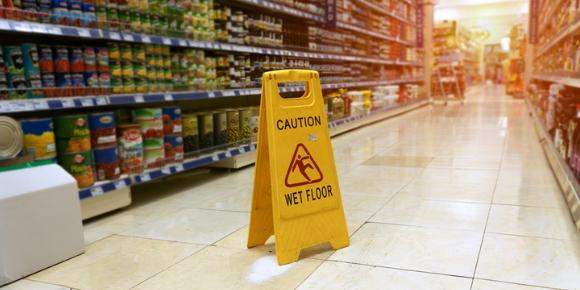
Top Causes of Supermarket Slip and Fall Accidents
- posted: Aug. 02, 2023
- Premises Liability
When you’re shopping in your local supermarket, your eyes are focused on shelves, freezers and other merchandise locations. You’re also navigating your cart through aisles and around other shoppers and goods displays. In general, you’re looking everywhere but to the floor, which is where significant dangers may be lurking.
Supermarkets are frequent scenes of slip and fall or trip and fall accidents, due to a host of reasons. Among the chief causes of these mishaps are the following:
- An employee creates an unsafe condition, such as leaving mopped floors wet and/or unmarked, failing to clean up spills or putting equipment or other obstructions in the path of customers.
- Another customer creates an unsafe condition, like spilling liquid on the floor or knocking down merchandise, and the store fails to correct the hazard promptly.
- The store management or property owner fails to maintain the premises, such as by not replacing loose tiles or fraying carpet or by not fixing sources of leaks.
- The store management fails to properly light the premises.
- Rainfall or snowfall causes water to be trekked onto floors, and the store management takes inadequate measures to protect customers from slipping.
If you slip or trip and fall in a supermarket, you may be able to recover financial compensation. To establish a claim, you must prove the following:
- A hazard — There was a dangerous condition on the premises.
- Causation — The hazard was the primary cause of the slip or trip and fall.
- Injury — The accident resulted in physical harm to you.
- Breach of duty of care — The store management failed in its responsibility to keep the premises safe, either by remediating known hazards or by keeping customers away from them with signs or barriers.
- Notice — The store management or property owner either knew or should they have known about the hazard.
Slip and fall cases often turn on difficult-to-prove facts. A customer’s own negligence can be a factor in determining the store’s degree of liability and the damages it owes. For example, the management may claim that a condition was so open and obvious that the customer should have noticed it and avoided it.
If you’re hurt in a slip and fall accident, the store may offer you money in exchange for you signing a waiver of your right to claim damages. Be cautious and seek legal counsel instead. An experienced supermarket liability law firm can assess your potential claim and take the actions necessary to get you the compensation you deserve.
Seigel Law in Ridgewood, New Jersey has wide experience handling premises liability cases stemming from slips and falls and other accidents. Call us at 201-444-4000 or contact us online to arrange a free consultation.

